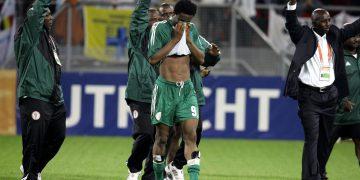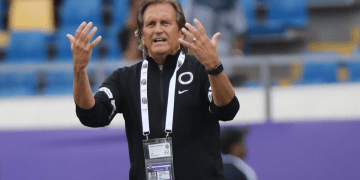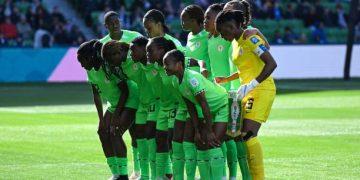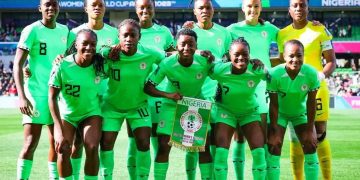The Olympics is an event that will always resonate with Nigerians as they watch the events of the Tokyo 2020 Olympics
Twenty-four years ago, the city of Atlanta, Georgia, hosted the Summer Olympics, and it proved to be the most iconic moment in not just Nigeria's football but the country's sports history.
The Nigerian men's football team, popularly called the Dream Team, upset all odds by going all the way to win the gold medal in the football event.
The 90s, especially the mid-90s, was the golden era of Nigerian football. The senior men's national team won the country's second Africa Cup of Nations title in Tunisia in 1994, while they also reached the second round in their first-ever World Cup in the same year.
Their success in the mid-90s was capped off by the gold medal at the 1996 summer Olympics, which happens to be the pick of the bunch for Nigerians.
Nigeria's run to the gold medal in Atlanta was not easy at all. It all started with a qualification match against Egypt, with Nigeria winning 3-2 in the first leg in Lagos before playing out a 1-1 draw in Cairo.
Two years earlier, the Super Eagles team had entertained fans at the 1994 World Cup in the United States. A couple of players from that squad made the 1996 Olympics team, as many were still under the age of 23.
The team had Jo Bonfere in charge, having previously served as an assistant to Clemence Westerhoff, who was the coach that led the national team to the World Cup two years earlier.
After seeing off Egypt to seal qualification, Nigeria began preparations in earnest. But just as it is happening now, the preparations were overshadowed by the drama between the NFF and Bonfere over unpaid wages and lack of funds.
Nonetheless, the team departed for the USA without the knowledge of the NFF or the media, even though funds were not provided.
According to former Super Eagles captain Sunday Oliseh, who was part of the squad, the players had to provide transportation and accommodation for themselves.
“With shortage of money to rent the buses from the FA, Victor Ikpeba and I had to use our own credit cards to rent three 12-seater mini-vans for the team,” Oliseh said in his book, Audacity to refuse.
But the situation got worse as the players began to complain over unpaid wages. Knowing it's a disaster waiting to happen, the NFF sent Shuaibu Amodu to the states with some money to offset some of the unpaid wages.
However, surprisingly, only the players were paid, with Bonfere left out. According to Oliseh, this annoyed the Dutchman, and he refused to join the team in training the next day.
But after seeing that the players also supported his actions, he changed his mind, even though he was still being owed.
It looked like the drama would affect the team's performance in Atlanta, but Oliseh revealed the players were motivated individually and as a team to go all the way.
The Dream team were drawn alongside Hungary, Japan and favourites, Brazil in their group. Prior to their opening game, Nigeria had not won a game in football at the Olympics.
However, that all changed as they beat Hungary courtesy of a goal from Nwankwo Kanu, who made a name for himself in that tournament.
The second match was against Japan, and it looked like the game was heading for a draw until Tijani Babangida scored the opening goal in the 82nd minute before Jay-Jay Okocha's penalty in the 90th minute sealed a comfortable victory.
Nigeria's third match was against a star-studded Brazil side, and they only needed to avoid a heavy defeat to seal qualification.
Brazil had suffered a shocking loss in the opening match against Japan before bouncing back by defeating Hungary in the second half.
The Brazilians needed to beat Nigeria to have a chance of qualifying, and they did just that, winning 1-0 courtesy of a goal from a certain Ronaldo (not that one)- the original Ronaldo.
Nonetheless, despite the defeat, Nigeria qualified behind Brazil for the quarter-finals. Their opponent in the quarter-final was Mexico, and it turned out to be their easiest match in the competition.
Bonfere Jo's men ran out 2-0 winners over Mexico, who finished the match with ten men. Jay-Jay Okocha and Celestine Babayaro were the goalscorers that day.
Nigeria's reward for beating Mexico was a semi-final clash with favourites Brazil. The Dream Team had lost to the talented Brazil team that had a young Ronaldo De Lima, Bebeto, Rivaldo and Roberto Carlos in the group stage.
This made them massive underdogs going into the semifinal encounter. However, what happened that day at the Sanford Stadium, Athens, was unimaginable and would live long till eternity.
Flavio Conceicao put the South Americans ahead courtesy of a free-kick in the first minute, but an own goal from Carlos in the 20th minute restored parity for Nigeria.
However, Brazil exerted their superiority as Bebeto put them ahead again in the 27th minute before Conceicao scored his second of the game ten minutes later.
Okocha had the chance to reduce the deficit from the spot, but he missed his penalty kick. At that moment, all odds were against Nigeria.
It looked to be over until Victor Ikpeba's strike 12 minutes from time gave the Dream Team a lifeline. But there was more drama as Kanu Nwankwo levelled scores in the added minutes to send the tie into extra time.
It was a scruffy goal, but nobody cared. But if his equaliser was sheer luck, his second, which sent Nigeria into the final, was a peach of a goal.
In that time, the golden goal in extra time was still a thing. A long ball fell off Ikepba's head into the former Arsenal striker's path on the edge of the box.
While other players would've taken a shot straight away, Kanu had other ideas. The ex-Inter Milan striker beat a Brazilian defender by feigning a shot before firing a left-footed strike that flew past Dida in goal.
The strike sent Nigeria into the finals at the expense of their illustrious opponents. Kanu's winner was arguably the most important in Nigeria's history.
The win was a memorable moment for Nigerians that they made a song about it. Remember the “When Nigeria beat Brazil”? That was the song.
What even made it more impressive is that the team had to sleep in a low-rated motel ahead of the game as the NFF had failed to book accommodation in the games village.
Meanwhile, it was really a devastating loss for the Brazilians. Their hotel was robbed while the match was being played, with over $50k worth of belongings stolen to add salt to the injury.
Nigeria's opposition in the gold medal match was another strong South American opposition in Argentina. Like Brazil, Argentina also had some talented players in the squad.
Players like Hernan Crespo, Claudio Lopez, Ariel Ortega and Diego Simeone- the current Atletico Madrid coach- were all part of Argentina's squad.
And just like the semi-final, Nigeria had to come back to win a dramatic match. Lopez put the Argentines ahead in the third minute, but Babayaro rose highest to head home the equaliser in the 28th minute.
But La Albiceleste went ahead again in the 50th minute, courtesy of a penalty from Crespo after Ortega was fouled in the box by Taribo West.
However, Daniel Amokachi's brilliant finish in the 74th minute drew Nigeria level again. And just as it looked like the game was heading into extra time, Emmanuel Amunike beat the offside trap to tap home Wilson Oruma's freekick.
Amunike's winner sparked wild celebrations at the final whistle as Nigeria won Africa's first gold medal in the Olympics football competition.
It was a much-needed win as the senior national team had also failed to defend their Afcon title after they were banned from travelling to South Africa by the then head of state, Sani Abacha.
The win also capped off Nigeria's golden era. Sadly, there is no Nigerian team in either the women's or men's football at the Tokyo Olympics.
But that moment in Athens 24-years ago will always stay with Nigerians forever.
There are claims that football should no longer be a part of the Olympics as it is not the pinnacle of the sport, but for Nigerians and maybe South Americans, football at the Olympics will always be important.





